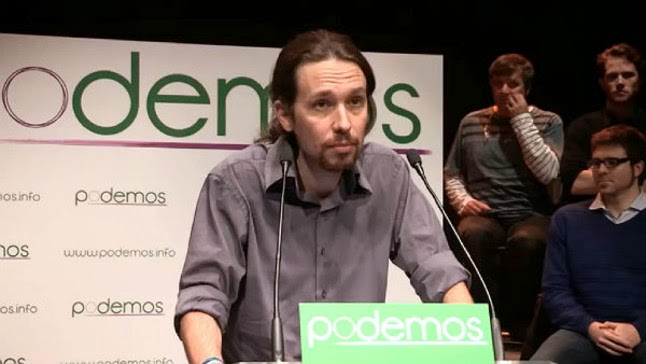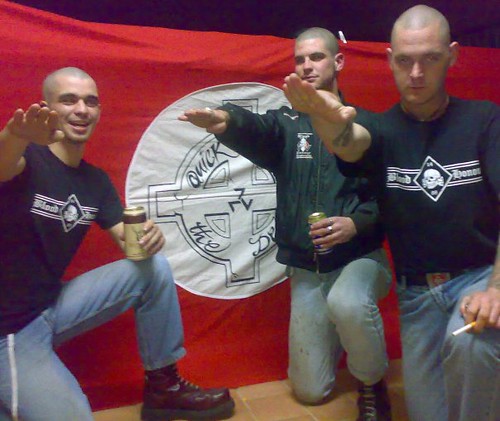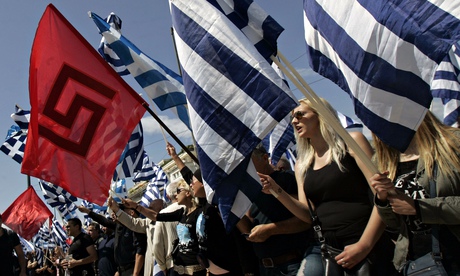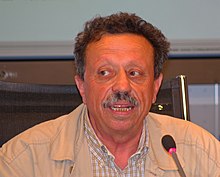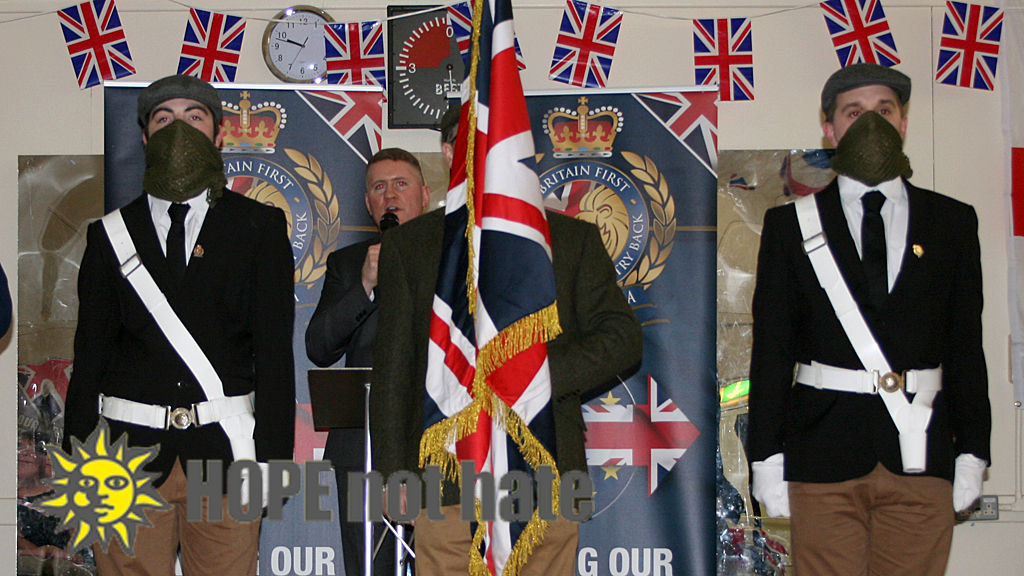http://www.counterpunch.org/2014/06/06/ ... n-fascism/The Durability of Ukrainian Fascismby PETER LEEReaders outside of Europe might not be aware of it, but spring is the fascist marching season in the Baltic republics.
In Estonia on February 16; February 16 & March 11 in Lithuania (anniversaries of 1918 and 1990 declarations of independence); and March 16 in Latvia (March 16, 1944 was first day the Latvian Legion fought alongside the Wehrmacht against the Red Army), local fascists parade to celebrate fascist principals and fascist heroes, most of whom collaborated in some ways with Nazi Germany during World War II while resisting the Soviet Union.
The big event for Ukrainian fascists is January 1, the anniversary of the birth of Stepan Bandera (1909-1959), leader of the OUN-B (Organization of Ukrainian Nationalists—Bandera) fascist faction.
This year, 15,000 people marched by torchlight in Kyiv on January 1 to commemorate Bandera.
Eastern European fascism is a durable and alarmingly vital ideology. It is not just a matter of atavistic affection for Hitler and Nazism by bigoted cranks.
And Ukrainian fascism is more durable and vital than most. It was forged in the most adverse conditions imaginable, in the furnace of Stalinism, under the reign of Hitler, and amid Poland’s effort to destroy Ukrainian nationality.
Ukrainian nationalism was under ferocious attack between the two world wars. The USSR occupied the eastern half of Ukraine, subjected it to collectivization under Stalin, and committed repression and enabled a famine that killed millions. At first, the Soviets sought to co-opt Ukrainian nationalism by supporting Ukrainian cultural expression while repressing Ukrainian political aspirations; USSR nationalities policies were “nationalist in expression and socialist in essence”. Then, in 1937 Stalin obliterated the native Ukrainian cultural and communist apparatus in a thoroughgoing purge and implemented Russified central control through his bespoke instrument, Nikita Krushchev.
Meanwhile, the eastern part of the Ukraine was under the thumb of the Polish Republic, which was trying to entrench its rule before either the Germans or the Russians got around to destroying it again. This translated into a concerted Polish political, security, cultural, and demographic push into Ukrainian Galicia. The Polish government displaced Ukrainian intellectuals and farmers, attacked their culture and religion (including seizure of Orthodox churches and conversion into Roman Catholic edifices), marginalized the Ukrainians in their own homeland, and suppressed Ukrainian independence activists (like Bandera, who spent the years 1933 to 1939 in Poland’s Wronki Prison after trying to assassinate Poland’s Minister of the Interior).
Ukrainian nationalists, therefore, were unable to ride communism or bourgeois democracy into power. Communism was a tool of Soviet expansionism, not class empowerment, and Polish democracy offered no protection for Ukrainian minority rights or political expression, let alone a Ukrainian state.
Ukrainian nationalists turned largely toward fascism, specifically toward a concept of “integral nationalism” that, in the absence of an acceptable national government, manifested itself in a national will residing in the spirit of its adherents, not expressed by the state or restrained by its laws, but embodied by a charismatic leader and exercised through his organization, whose legitimacy supersedes that of the state and whose commitment to violence makes it a law unto itself.
That leader, at least for many Ukrainians of the fascist persuasion, was Stepan Bandera. The organization, his OUN-B faction.
This state of affairs persists in today’s successor to the OUN-B, Pravy Sektor, with its fascist trappings, leader cult, and paramilitary arm. The “mainstreaming” of the second major fascist grouping, Svoboda, looks more like a strategic repackaging in order to strive for greater electoral success by hiding its fascist antecedents.
So, unfortunately for apologists for the current Kyiv regime, the correct description of these two groups is not “nationalist” or “ultranationalist”; it is “fascist”.
Fatally, the Ukrainian government has turned to fascist nationalism and heroes in order to forge a post-Soviet, essentially Ukrainian, identity for the post-1991 state.
In a recapitulation of a trend in eastern Europe to resurrect World War II era nationalist fascists—some of whom actively collaborated with the Nazis—as rallying points for anti-Russian sentiment, Bandera has also been adopted as a Ukrainian national hero: in 2010 President Yuschenko posthumously (and, according to a court in pro-Russian Donetsk, illegally) awarded Bandera the title of Hero of Ukraine.
The uncomfortable truth is that the government has invested enough effort into celebrating Bandera as a national hero that the epithet “Banderite” that pro-Russian elements apply to the Kyiv regime is not terribly far from the mark.
For obvious reasons, Russian propaganda has labored mightily to characterize Bandera as a Nazi, so that he can be condemned as a collaborator with Hitler in his war on the USSR and the world, and not an independence fighter against Russia and its brutal and extremely unpopular (for ethnic Ukrainians, at least) rule over eastern Ukraine.
Actually, Banderan fascism, with its focus on establishing a pure Ukrainian state, was only tangentially related to Hitler’s expansionist extravagances, which centered on an apocalyptic war against the “Judeo-Bolshevism” that, in Hitler’s view, stood between Germany and its rightful place as lord of a racially cleansed Europe and a global empire rivalling those of the United States and Great Britain.
Bandera was not an important Nazi collaborator, albeit because he was never given a real chance. Ukrainian independence activists of every stripe threw themselves at the Nazis in the Thirties, seeing Germany as the only force that could destroy both of their hated oppressors—Poland, for the western Ukrainians, and the USSR for the eastern Ukraine.
However, the Nazis were contemptuous of Slavs, who were assigned the role of hewers of wood and drawers of water in the new Aryan order. Ukrainian workers transported to Germany as laborers were subjected to miserable and degrading treatment as they sweated for the Reich.
The notorious ethnic Ukrainian “Galician SS” and “Nachtigall” and “Roland” military formations apparently were kept on a short leash by the Germans, did not accomplish a great deal during World War II, and only saw serious action when the Nazis got really desperate.
The Nazis were above all determined to keep a tight grip on Ukraine, which was a central region for their concept of a Slav-free Lebensraum for Germans and a key zone for their military operations against the USSR. They recognized that Bandera’s bedrock interest was in creating a Ukrainian state free of anyone’s control and were well aware of his tendency toward bloody mischief. The Nazis detained him for most of World War II and only released in a “too little too late” effort to slow up the Red Army as it drove Germany out of eastern Europe in 1945.
Post-war, a German officer made the telling observation that the war in the east was not lost at Stalingrad; it was lost “long before that—in Kiev, when we hosted the swastika instead of the Ukrainian flag!”
Stepan Bandera was an unapologetic fascist and terrorist whose OUN-B faction launched an unimaginably brutal campaign of ethnic cleansing campaign through slaughter during World War II. Yale historian Thomas Snyder, who is an enthusiastic cheerleader for almost all things EuroMaidan, draws the line at exalting Bandera.
The Nazis killed tens of millions of anonymous strangers in the East as part of a war of conquest meant to Germanize Europe to the Urals; the Ukrainians of the OUN-B murdered tens of thousands of their neighbors while trying to rip a national state out of the social and political fabric of eastern Europe.
Like Hitler, Bandera was keen to purify the “homeland” of impure elements. Unlike Hitler, Bandera only had the chance to turn his fury on his enemies—primarily the Poles of Galicia–for a few months.
5000 Ukrainian police defected with their weapons to join Bandera’s faction as Nazi rule crumbled in Ukraine, and provided the muscle for the most notorious Bandera action of the Second World War: the massacre of Poles in what is now western Ukraine.
Historians generally agree that Bandera’s forces committed systematic atrocities in order to institute a reign of terror that would drive out the Poles out.
Norman Davies:
Villages were torched. Roman Catholic priests were axed or crucified. Churches were burned with all their parishioners. Isolated farms were attacked by gangs carrying pitchforks and kitchen knives. Throats were cut. Pregnant women were bayoneted. Children were cut in two. Men were ambushed in the field and led away.
Timothy Snyder:
Ukrainian partisans burned homes, shot or forced back inside those who tried to flee, and used sickles and pitchforks to kill those they captured outside. In some cases, beheaded, crucified, dismembered, or disemboweled bodies were displayed, in order to encourage remaining Poles to flee.
Various estimates calculate that somewhere between 35,000 and 100,000 Poles died in the Bandera terror.
Bandera’s champions point to the fact that he was still in German detention when the massacres took place and there is no evidence that he explicitly ordered the massacres. But given his ideology, his detestation of the Poles, and his role as the charismatic leader of his faction, it seems unlikely his subordinates undertook this massive enterprise on their own initiative.
One of Bandera’s lieutenants was Roman Shukhevych. In February 1945, Shukhevych issued an order stating, “In view of the success of the Soviet forces it is necessary to speed up the liquidation of the Poles, they must be totally wiped out, their villages burned … only the Polish population must be destroyed.”
As a matter of additional embarrassment, Shukhevych was also a commander in the Nachtigall (Nightingale) battalion organized by the Wehrmacht.
Today, a major preoccupation of Ukrainian nationalist historical scholarship is beating back rather convincing allegations by Russian, Polish, and Jewish historians that Nachtigall was an important and active participant in the massacre of Lviv Jews orchestrated by the German army upon its arrival in June 1941.
It’s an uphill battle. Bandera had classified Jews as “second order enemies” thanks to their perceived role as collaborators and adjuncts to the Polish and Russian strategy of “divide and conquer” against Ukrainian nationalism. Anti-Semitism, indeed, is a staple of modern Ukrainian fascism and has undoubtedly contributed to the emigration of 60% of Ukraine’s Jews—340,000 people—since independence.
Shukhevych remains a hero to Ukrainian fascists today. Most importantly—since Bandera was assassinated in Munich by the USSR in 1959 and left no issue—he serves as the direct lineal ancestor of Ukraine’s key fascist formation, Pravy Sektor.
In February 2014, the New York Times’ Andrew Higgins penned a rather embarrassing passage that valorized the occupation of Lviv—the Galician city at the heart of Ukrainian fascism, the old stomping grounds of Roman Shukhevych and the Nachtigall battlaian, and also Simon Wiesnthal’s home town—by anti-Yanyukovich forces in January 2014:
Some of the president’s longtime opponents here have taken an increasingly radical line.
Offering inspiration and advice has been Yuriy Shukhevych, a blind veteran nationalist who spent 31 years in Soviet prisons and labor camps and whose father, Roman, led the Ukrainian Insurgent Army against Polish and then Soviet rule.
Mr. Shukhevych, 80, who lost his sight during his time in the Soviet gulag, helped guide the formation of Right Sector, an unruly organization whose fighters now man barricades around Independence Square, the epicenter of the protest movement in Kiev.
https://johnib.wordpress.com/tag/yuriy-shukhevych/Yuriy Shukhevych’s role in modern Ukrainian fascism is not simply that of an inspirational figurehead and reminder of his father’s anti-Soviet heroics for proud Ukrainian nationalists. He is a core figure in the emergence of the key Ukrainian fascist formation, Pravy Sektor and its paramilitary.
And Pravy Sektor’s paramilitary, the UNA-UNSO, is not an “unruly” collection of weekend-warrior-wannabes, as Mr. Higgins might believe.
UNA-UNSO was formed during the turmoil of the early 1990s, largely by ethnic Ukrainian veterans of the Soviet Union’s bitter war in Afghanistan. From the first, the UNA-UNSO has shown a taste for foreign adventures, sending detachments to Moscow in 1990 to oppose the Communist coup against Yeltsin, and to Lithuania in 1991. With apparently very good reason, the Russians have also accused UNA-UNSO fighters of participating on the anti-Russian side in Georgia and Chechnya.
After formal Ukrainian independence, the militia elected Yuriy Shukhevych—the son of OUN-B commander Roman Shukhevych– as its leader and set up a political arm, which later became Pravy Sektor.
Also after independence in 1991, the unapologetically fascistic Social Nationalist Party—with, inevitably, its own paramilitary, Patriots of Ukraine—was set up under the leadership of Andriy Parubiy.
Parubiy left the Social Nationalist Party in 2004, when it became the vehicle for the political aspirations of Oleh Tyahnybok and became the Svoboda Party. Parubiy’s motivations are relatively opaque, but I would argue he left to become the fascist Trojan horse inside Yulya Tymoshenko’s Fatherland party. Indeed, while Timoshenko’s political clout dwindled during her imprisonment, Parubiy was a key organizer of “volunteers” at Maidan and emerged as the secretary of the National Security and Defense Council of Ukraine, charged with handling the “anti-terrorist” operations in the east.
Rather Panglossian analyses of Ukranian fascism usually take as their point of departure the dismal showing of Pravy Sektor and Svoboda in the 2014 presidential election.
The two fascist parties polled less than 2% combined in the 2014 presidential poll. Hoever, this is probably a misleading indicator of their strength. Pravy Sektor’s Yarosh had announced he wouldn’t run an active campaign, presumably as part of a deal at the behest of EuroMaidan’s Western backers to help Petro Poroshenko avoid a run-off with Yulya Tymoshenko. As for Tyahnybok, Svoboda got 10% of the vote in the parliamentary elections of 2012, and it seems implausible that his backing has completely collapsed after his high-profile role in the triumphant Maidan troika together with Klitschko and Yatsenyuk.
In any case, as noted above, fascists do not regard the state, its constitution, and the electoral process as the vehicle for Ukrainian national aspirations. That role is reserved for the leader, the party, and the paramilitaries. What matters to fascists is their influence in the affairs of the nation, and in Ukraine that influence is significant.
When eastern Ukraine rose up, the current Kyiv government, admittedly laboring under significant disabilities of illegitimacy, incompetence, and penury, has experienced immense difficulties in rallying a multi-ethnic Ukrainian nation. It was almost a foregone conclusion that fascist paramilitaries would be called upon to supplement or even replace the wavering regime forces in the field.
In an eerie—well, perhaps, predictable—recapitulation of the OUN-B’s opportunistic military collaboration with the Wehrmacht, Pravy Sektor leader Dmytro Yarosh organized the “Donbass Batallion” to assist the Ukrainian government’s operations in the east. Pravy Sektor leaders and rank and file have also apparently augmented if not formed the oligarch-funded Dniepr Battalion–currently one of the few military formations operating in the east that is reliably and brutally loyal to the Kyiv regime.
Even though it is plausibly alleged that Russia is inciting and abetting resistance, local resentment against Kyiv and its heavy-handed tactics is undeniably present and apparently increasing, and perhaps with it the need for fascist backbone and muscle to subjugate the unruly east.
The optimistic European scenario is for Ukraine’s barely acknowledged fascist problems to melt away as European integration and prosperity do their moderating work, and Ukraine emerges as another Poland: politically stable, united, democratic, and reliably anti-Russian.
However, it is an ugly truth that Poland had its issues of national identity resolved by Hitler, Stalin, and the Holocaust, which stripped away the complicating nationalities issues posed by its German, Ukrainian, and Jewish populations. Before World War II, one-third of Poland’s population was “minorities”. Today, Poland is 96% “Polish”.
Ukraine, on the other hand, carries a legacy of division thanks to the USSR’s administration of western Ukraine before World War II, and Russian domination of the Kiev elite during the Soviet period. About 18% of Ukrainians are ethnic Russian; but 30% of the population is native-Russian speaking. In the western oblasts currently battling Kyiv, the percentage of Russian speakers ranges from 72% (Dnipropetrovsk) to 93% (Donetsk). Crimea, now annexed to Russia, was 97%.
Unless the Kyiv regime unwittingly solves its problem by escalating the crisis to the point that Russia annexes the eastern oblasts and removes Russian Ukrainians from the nationalist equation, a plausible forecast for Ukraine is failure, polarization, poverty, violence—and fascist political success as Russian ethnic and linguistic identity become signifiers for looming threats to the Ukrainian state.
But in evaluating the outlook for fascism in Europe, it is a mistake to think fascists are just fighting the last war—finishing up the de-Bolshevization and de-Russification of eastern Europe that Hitler was only able to begin.
Communism isn’t the only light that’s failing.
Ukrainian fascists love the Russia-hammering NATO, but detest the Russia-accommodating and supra-nationalistic EU.
And they aren’t alone. Fascism—and anti-EU sentiment—pervade parts of Europe that never felt Stalin’s wrath. In the last elections for the European Parliament, “eurosceptics” and xenophobic ultra-nationalists scored significant gains, led by Marine Le Pen, whose National Front took 25% of the French seats.
A lot of it has to do with the equivocal track record of globalized neo-liberal capitalism in the last decade. We’re all Pikettyists now, and it seems that among the most important outcomes of neo-liberalism are income inequality and oligarchs.
It is anathema to liberal democrats, but it should be acknowledged that fascism is catching on, largely as a result of a growing perception that neo-liberalism and globalization are failing to deliver the economic and social goods to a lot of people.
Democracy is seen as the plaything of oligarchs who manipulate the current system to secure and expand their wealth and power; liberal constitutions with their guarantees of minority rights appear to be recipes for national impotence. Transnational free markets in capital and goods breed local austerity, unemployment, and poverty. Democratic governments seem to follow the free market playbook, get into problems they can’t handle, and surrender their sovereignty to committees of Euro-financiers.
Fascism, with its exaltation of the particular, the emotional, and the undemocratic provides an impregnable ideological and political bulwark against these outside forces.
Fascism has become an important element in the politics of resistance: a force that obstructs imposition of the norms of globalization, and an ideology that justifies the protection of local local interests against the demands of liberal democracy, transnational capital, and property and minority rights.
Maybe it’s neo-liberalism, not fascism, that is facing a crisis of legitimacy and acceptance.
So the idea that fascism can be treated as a delusional artifact of the 20th century and the challenge of fascism to the neo-liberal order can be ignored is, itself, wishful thinking.
Even if the European Union grows and flourishes, it will continue to have a hard time outrunning the perception that it delivers its benefits preferentially to a limited subset of nations, corporations, and individuals, at the expense of the many.
In eastern Europe, add to the incendiary mix the perception that the EU, that bastion of liberal democratic and free market ideals, has very little will or even interest in standing up to Russia.
This sentiment will not exclusively spawn benign “Green” and “Occupy” progressive movement, that combine their allegiance to democracy and human and individual rights with their well-earned reputations for internal division, political impotence, and unwillingness to confront.
For some, resentment will, inevitably, congeal around nationalism and the perception that fascist resistance, defiantly militant, uncompromising, and irrational, racial and undemocratic, exclusionary and brutal, is the best instrument to achieve local identity and agency—power– in an ever bigger, more dangerous, and less responsive continental order.
Fascism, I’m afraid, isn’t just part of Europe’s past; it’s part of Europe’s future.
Peter Lee wrote a ground-breaking essay on the exposure of sailors on board the USS Reagan to radioactive fallout from Fukushima in the March issue of CounterPunch magazine. He edits China Matters.




